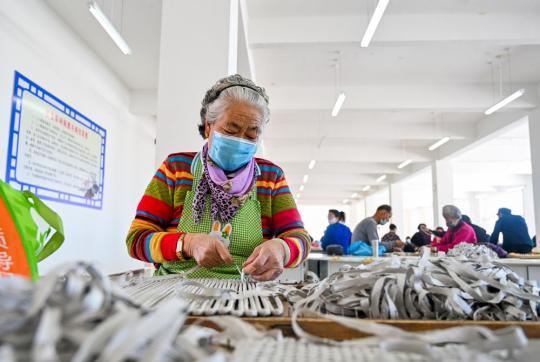Poor laborers in Chahar Youyiqianqi, Inner Mongolia, processed disposable slippers in the poverty alleviation workshop. Xinhua News Agency reporter Lian Zhenshe
Xinhua News Agency, Hohhot, April 5th (Reporters Zhang Honghe, Beihan Khan) In the spacious and bright workshop, the sewing machine slaps, and various fabrics and soles "walk" between the fingers and the needle, gradually becoming one. Shuangshuang disposable slippers. 46-year-old Han Fengrong was busy in the production line wearing a mask, and the resumption of work in the poverty alleviation workshop made her eat "reassuring pills."
Han Fengrong is a farmer in the village of Chahar Youyiqianqi, Wulanchabu, Inner Mongolia Autonomous Region. Ulan Qab, a land with barren land, wind erosion and desertification, and cold weather, is the main battlefield of poverty alleviation in Inner Mongolia. Among the 11 flag counties and districts under its jurisdiction, there were 8 national-level poverty-stricken flag counties and 2 autonomous-level poverty-stricken flag counties. The population once occupied 46.2% of Inner Mongolia.
A few years ago, Han Fengrong ’s husband lost his ability to work due to a car accident, and her family ’s life plummeted, becoming a poor household. At the beginning of last year, a counterpart aid company in Beijing opened a poverty alleviation workshop near her home and produced hotel disposable slippers for export to Japan. Under the government's matchmaking, Han Fengrong, the only labor force in the family, came here to work as a sewing worker, earning a minimum of 2,700 yuan a month.
Zhang Lanzhi, an elderly relocated in Zhuozi County, Inner Mongolia, is weaving a car seat cushion. Xinhua News Agency reporter Lian Zhenshe
"Because of the epidemic, the poverty alleviation workshop was delayed by 25 days from the original plan. I saw the factory resumed production and could come to work to make money. I was very attentive." Han Fengrong cherishes this job very much. Because of this job, her family's life is obvious To improve, we have successfully lifted out of poverty last year.
Although the last seven national-level poverty-stricken counties in Ulanqab have all been lifted out of poverty in early March of this year, the locals still have n’t taken off their hats and tried hard to consolidate the results of poverty alleviation. Over the past few days, while doing a good job in epidemic prevention and control, Ulanqab city has promoted the orderly resumption of labor in the poverty alleviation workshop. At present, of the 96 poverty alleviation workshops in Ulanqab City, 70 have resumed production and resumed production, and 106 of the leading enterprises have resumed production and resumed production, which has solved nearly 10,000 poor laborers nearby and on-site employment.
On the morning of every working day, 69-year-old Liu Runmei went downstairs and walked for two minutes. She came to the poverty alleviation workshop in her residential area to weave car cushions, and can earn an income of nearly 1,000 yuan a month. Liu Runmei lives in Zhuozi County, Ulan Qab City, who has just taken off the "hat" of a national poverty-stricken county. At the end of last year, through the relocation project implemented by the state, this farmer who planted potatoes and oatmeal on barren land for a lifetime, said goodbye to the poor mountain ditch and moved to the relocation resettlement community in the county.
Poverty alleviation workshop for processing and exporting disposable slippers in Chahar Youyiqianqi, Inner Mongolia. Xinhua News Agency reporter Lian Zhenshe
In the community where Liu Runmei lives, the most popular place is the three-story poverty alleviation workshop. Here, all relocated people who live in the community without the ability and conditions to go out to work can achieve employment at their doorstep.
In the workshop on the first floor of the poverty alleviation workshop, 45 to 60-year-old relocators sew work clothes with dark blue fabrics. Because smart devices are installed, they only need to put the cloth pieces on the machine as required; the second floor In the workplace, the relocation personnel aged 60 to 70 are engaged in car seats, Chinese knots, storage basket weaving, etc .; in the workplace on the third floor, the elderly over 70 are engaged in easy-to-operate tasks such as cotton swab packaging and plastic turf production.
The silver-haired old man Zhang Lanzhi sat at a table filled with cotton swabs, and packed every 50 cotton swabs into a bag. The old man said: "We rural people can't stay at home, this place of work is in the community, come here every day to do some work, and can earn 600 to 800 yuan a month."
It is understood that at present, there are poverty-relief workshops in the five relocation resettlement communities in Zhuozi County, and 2,572 weak labor-relocated people have been employed at home. At the same time, the local through a variety of tailor-made supporting industries has basically solved the employment problem of relocated people, to achieve mobility, stability, ability to get rid of poverty, and prosperity.
"Only the development of the industry can solve the poverty problem in a long-term and stable way. Inner Mongolia encourages all regions to adopt the method of rewards and supplements to support the development and growth of the poverty alleviation workshop." Said Ge Lin, director of the Policy and Law Division of the Poverty Alleviation Office of the Inner Mongolia Autonomous Region.

